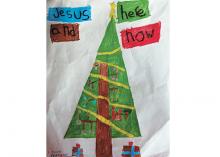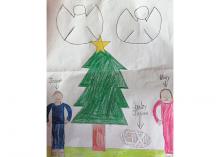I was eight years old. That year, the Sunday school Christmas pageant was going to be a no-fuss event. All the kids were going to stand up in a line, each of us reciting a memorized verse from Luke’s Christmas story.
“And when they had seen it, they made known abroad the saying which was told them concerning this child.”
That was my line. I was disappointed!
My best friend, the pastor’s daughter, got to say the most phenomenal line in history: “And the angel said unto them, ‘Fear not: for, behold, I bring you good tidings of great joy, which shall be to all people. For unto you is born this day in the city of David a Saviour, which is Christ the Lord.’”
But I was stuck with the most wooden and clunky line in the whole narrative. From song to prose. From angel armies to a band of dirty shepherds. From the heraldic singing to throaty midnight shouts. From divine revelation to human proclamation.
As an adult reading this story, though, I am particularly struck by that line about the shepherds making known abroad the saying which was told to them concerning this child, even though I still think it sounds a bit clunky.
The passage nails a central movement in the shepherds’ experience of that very first Christmas. It was their transition from: “O, Come Let Us Adore Him” to “Go, Tell it on the Mountain.” From seeing to recounting, and from adulation to proclamation!
I imagine the pounding of their feet, heavy breathing, running, walking and running again, breathlessly, through the deep darkness and night air. The shepherds believed that the world had changed and, with burning lungs and sweating brows, they went into the fields, taverns, inns, hovels and houses to proclaim this revolution.
What did they shout? I’m not sure. I suppose that the Messiah was there. I am certain they were greeted with looks of incredulity. Perhaps, some hearers were angry that they had been wakened from a sound sleep, some eyeing the shepherds suspiciously, looking for signs of drunkenness or prankishness or madness. A few, perhaps, were curious.
When I imagine the scene, Christina Rossetti’s poem “In the Bleak Midwinter” comes to mind: “. . . frosty wind made moan / Earth stood hard as iron, water like a stone / Snow had fallen, snow on snow, snow on snow. . . .”
I imagine the shepherds running on ground hardened by frost, their laboured breaths visible in the night air. Of course, the snow and ice don’t fit into a historical or geographical sense, but the winter scene expresses a metaphorical truth about the harshness of the world into which this baby had entered, frail and vulnerable, as all babies are. A kind of cold and bitter poverty. Shepherds living in the fields, their lives filled with the capriciousness of imperial edicts, the unkindness and inhospitality of strangers, the massacre of innocents, the displacement of people from their homes and kindred.
This world is still familiar to us after 20 centuries of stony sleep, as thousands of children are kept in tent cities along the U.S. southern border, and many people are starving in the Middle East. For motives as petty and insipid as Herod’s or Pharaoh’s—just so a ruler can hold onto a certain kind of power a little bit longer.
It is pretty much a Christmas tradition to remark that there is no peace on earth, no goodwill towards humankind. To say that the world was transformed, that it has turned at Christmas time, seems to deny its revolutions of 2,000-plus years. The turning and turning and turning of a weary world. And whether we think that the world is much the same as it has always been, or that it is something altogether new, there still seems to be little room for the kind of proclamation that is so central to the Christmas story: “Joy to the world, the Saviour reigns!”
Mary, the mother of Jesus, speaks eloquently in her revolutionary announcement: “He has scattered the proud in the thoughts of their hearts. He has brought down the powerful from their thrones, and lifted up the lowly; he has filled the hungry with good things, and sent the rich away empty” (Luke 1:51b-53).
The proclamation of the lordship of Jesus Christ is at the very heart of the Christmas story, and it has been from the very first. From the time of the prophet Isaiah come his words to weary mortals, from a weary God: “The Lord himself will give you a sign. Look, a virgin, a young woman, is with child and shall bear a son, and shall name him Immanuel.”
What is the place of proclamation in our celebration of Christmas? How do we proclaim this ascendency of a new king? How do we go and tell about a world that is about to turn? What does it mean that, everywhere we look, things seem to deny the lordship of Bethlehem’s baby?
Part of this Christmas proclamation is hope. Not optimism that things are going to go our way, not a confidence in our abilities or in our connections. This proclamation is not a pie-in-the-sky hope, a painkiller that takes the harsh edges off our collective despair and frustration. Proclamation is a restless hope, a striving hope, a moving hope. The kind of hope that does not explain away present injustices but instead renders them unbearable.
Christmas proclamation is the promise that in Christ’s name all oppression shall cease, that thorns will no longer oppress the ground, that the slave is our kin, that the Saviour reigns. The Christmas proclamation is not just a promise that the Saviour will reign, but it is the affirmation that the Saviour does reign. At Christmas, we must proclaim not only the coming of—but the actual arrival of—the revolution. The future is here and now: in our city, on our street and here in our church.
“This will be a sign for you: You will find a child wrapped in bands of cloth and lying in a manger.” Yes, indeed. This baby wrapped in swaddling clothes is a sign of hope and promise. But this baby is more than just a sign. He is the real, historical, physical presence of God with humanity. Jesus Christ is not just a sign that God will be with us, but that God is with us.
This is revolutionary. This is evidence that the world has turned. Everywhere we look, we see signs of the kingdom, some as small as a mustard seed; others, a marvel to our eyes.
The world has long been weary of the proclamation that Jesus is supreme. Through centuries of history, when empires ruled in Jesus’ name, that declaration wasn’t necessarily so good. Do we really want to belt out to the world: “Receive your king!”?
We live in a world, and among a host of Christians, who rightly doubt the wisdom of proclaiming, “Jesus is Lord.” But then there are these pesky biblical texts around which we’ve ordered our convictions on peace and justice, grace and mercy, salvation as liberation. These texts unswervingly announce the reign of God in Jesus as being for every tongue, tribe and nation.
The Christmas song, “O, Holy Night,” was controversial when it was first written. Author Placide Cappeau de Roquemaure was known in his small French community for being against slavery and for being a socialist. Because of his reputation, local people read the song’s text with the suspicion that it contained an insidious, revolutionary message. This is the salvific message of this Christmas carol: “Truly he taught us to love one another / His law is love and his gospel is peace / Chains shall he break, for the slave is our brother / And in his name all oppression shall cease / Sweet hymns of joy in grateful chorus raise we / Let all within us praise his holy name / Christ is the Lord, O praise His name forever / His power and glory evermore proclaim.”
How do we proclaim the revolution that is Immanuel, God with us? How would our Christmas celebrations change if we began to think of them as proclamations? How would they change if we began to think of them as signs that surely God is with us—all of us?
Maybe seeing our celebrations this way would change the tone with which we said: “Merry Christmas.” Maybe it would change our Christmas merriment—and who we invited to the party. If we saw our celebrations as proclamation, would that perspective change the gifts we gave? Would it change who we gave presents to?
And this shall be a sign unto you. Immanuel! A new world is coming; it is already here.
During the Christmas season, and as we prepare to enter into the New Year, let us ask ourselves: “How can I live in such a way that my life is a sign of God’s kingdom?” Let us live in such a way that our Christmas singing makes worldly powers nervous and petty potentates a bit uneasy. Let us live in such a way that our living proclaims Immanuel.
Jodie Hatlem is a pastor at Erb Street Mennonite Church, Waterloo, Ont. Adapted from a sermon she preached there on Dec. 23, 2018.
For discussion
1. What memories do you have of Christmas pageants, either from when you were young or more recently? How elaborate were they? Why do some churches go to a great deal of effort to carry on this tradition? How effective are pageants in proclaiming the lordship of Christ to the world?
2. Jodie Hatlem suggests that the characters in the Christmas story lived in a harsh world. What people today are experiencing displacement, lack of hospitality or capricious imperial edicts? What does the message of “Joy to the world, the Saviour reigns” mean to them and how might it be different for those who live in greater comfort?
3. Mary’s song is revolutionary with its reference to scattering the proud, bringing down the powerful and sending the rich away empty. How can our Christmas celebrations also proclaim this revolution?
4. Hatlem writes, “This baby in swaddling clothes is a sign of hope and promise,” because it indicates the “physical presence of God with humanity.” Where do you see evidence that Christ is reigning now? Where are the signs of hope and promise in the world today?
—By Barb Draper






Add new comment
Canadian Mennonite invites comments and encourages constructive discussion about our content. Actual full names (first and last) are required. Comments are moderated and may be edited. They will not appear online until approved and will be posted during business hours. Some comments may be reproduced in print.